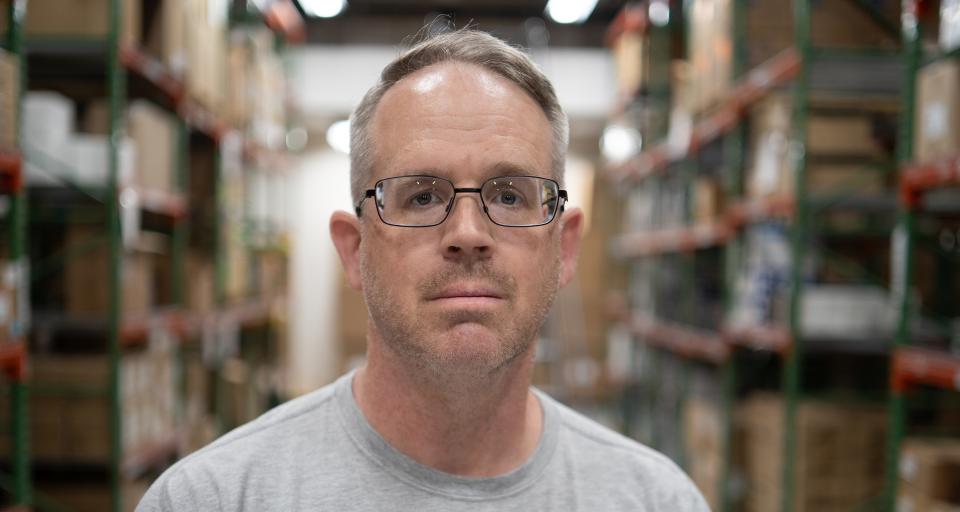Meet State Laboratory of Public Health Staff
Find State Laboratory of Public Health staff based on discipline:
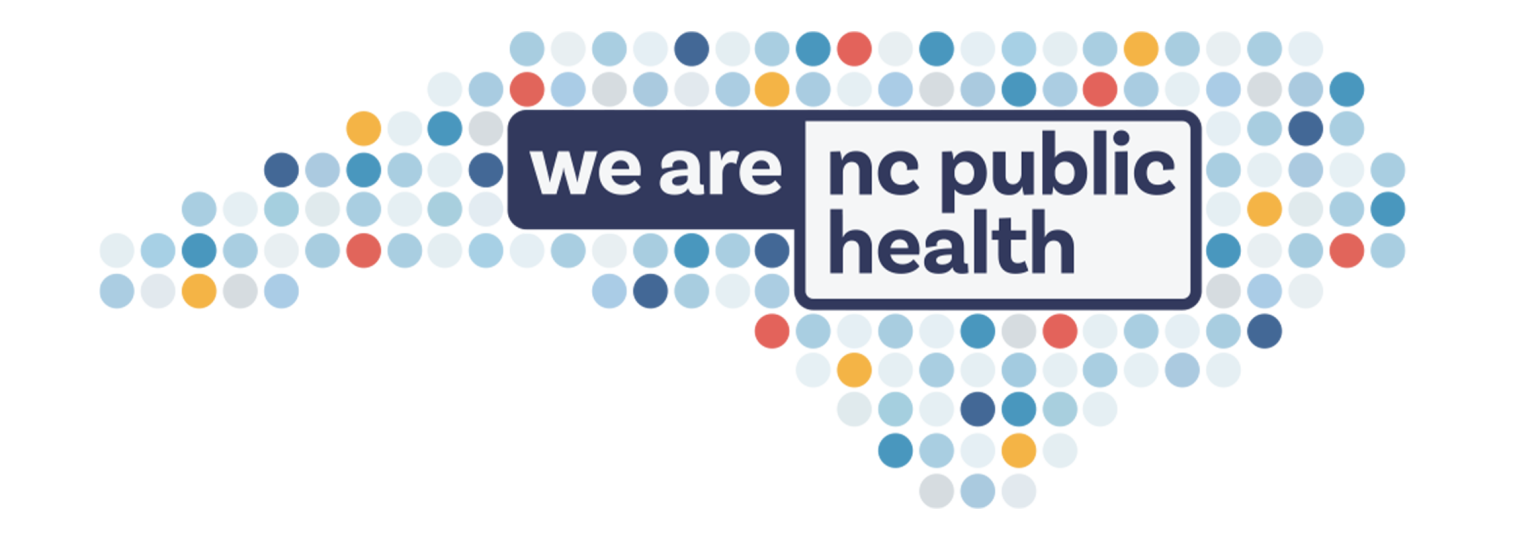
David, Chemical Terrorism and Threat (CTAT) Unit

"I received a biochemistry degree from NC State University and volunteered at the NC State Laboratory of Public Health while in college. In 2011, I started working in the Hemachemistry unit at the NCSLPH a year after graduating. While working in the Hemachemistry unit, I asked if I could get hands-on experience with the instruments in the Chemical Terrorism and Threat unit when they had down time. Eventually, I had a good understanding of the instruments and had four years of experience on the ICP/MS when a position opened. I started out as a chemist I and over time moved up to a chemist II.
"My favorite part of this work is solving problems — whether it is trying to figure out an unknown sample or why an instrument is not running correctly — and being able to fix it. Any time I solve the problem, I feel accomplished. When needed, our services also help medical providers treat their patients."
Jin, Bioterrorism and Emerging Pathogens (BTEP) Unit

"I graduated from UNC Chapel Hill with a bachelor’s in biology and anthropology. While at UNC, I was a lab assistant for a lab in the biology department. After graduating, I was a technologist for a health care company where I ran diagnostic tests on infectious diseases. My favorite parts of my job are my coworkers, who are intelligent, kind and fun to talk with; we can quickly adapt to any changes and work efficiently to complete all testing which makes things go smoothly.
"The COVID-19 pandemic and mpox outbreak are two important examples that show the importance of public health. Public health is important to maintain the safety of everyone and minimize the risk and spread of potential threats."
Allen, Inorganic Chemistry Unit

"After graduating from Duke with a B.S. in physics and a brief stint as a seismic instrumentation engineer, I worked for 12 years in the plastics industry, with most of that time spent as an R&D chemist specializing in room-temperature thermoset resins. During the pandemic, I saw the opportunity to pivot toward working in public health and jumped at the chance.
"Besides the NCSLPH being a welcoming and friendly environment, I like knowing that the work I do can have a real impact on my community. Public health is an important tool for gathering information to inform policies and provide mechanisms to act in the best interests of whole populations."
Chris, Environmental Microbiology Unit

"I started out at NCSLPH in environmental microbiology in the Environmental Sciences Unit in 1999. I’ve worked in environmental science metals analysis, clinical microbiology, and bioterrorism and emerging pathogens. I then returned to environmental sciences to be a certification officer in laboratory certification. I also became an FDA milk laboratory evaluation officer. Certifying laboratories for over 10 years for most of the tests used in environmental sciences has really helped me now, as manager of the Environmental Sciences Unit.
"I love that we find those needles in the haystack that led to an illness or a contaminant that nobody would expect us to find or identifying the obscure item that caused a child’s lead poisoning. Other environmental divisions protect their environment; our job is to protect the citizens of North Carolina from their environment. Clinical labs diagnose the illness; we provide another piece of the puzzle by showing where the hazard came from so it can be eliminated."
Cille, Radiochemistry Unit

"I graduated from Lander University with a Bachelor of Science in chemistry and started working in various environmental labs. When I started in radiochemistry, I had a few wonderful mentors, and I was as excited about the lab as they were. In 2019, I was given the opportunity to come to the radiochemistry lab at NCSLPH and became supervisor of the lab in 2021. I love the people I work with and knowing that what I do plays a role in ensuring that the environment in North Carolina is safe.
"This lab’s work shows the citizens of North Carolina that we are monitoring a variety of samples to ensure that all nuclear facilities are operating safely."
James, Organic Chemistry Unit

"I received my bachelor’s degrees in science education and chemistry from NC State University. I started my career as a high school science teacher and discovered that I enjoyed lab work more than teaching. I started at the State Lab as a medical laboratory technician in the Rabies/Viral Culture Lab until a chemistry technician position became available in the Organic Chemistry lab and worked my way up from technician to supervisor.
"I love doing lab work. Though most of what I do is routine, I really enjoy being able to solve problems that come up. Having access to safe drinking water is foundational to good health. Our work is crucial in ensuring the citizens of N.C. have water that is clean and safe."
Monica, Wastewater Surveillance Unit

"I have a bachelor’s degree in chemistry and a minor in biology from Appalachian State University. I graduated in 2019 and worked as a vet assistant for over two and a half years and really enjoyed the lab analysis. Since I enjoy lab analysis, I knew I wanted to focus more on laboratory work and analyzing data, which led me to my current position.
"Wastewater surveillance is a new program. Samples must be heat pasteurized and cooled before filtration. Once prepared, the samples are filtered and RNA is extracted. The RNA is used to quantify the concentration of COVID in wastewater. Each week we monitor the concentration of SARS-CoV-2 in the wastewater samples we receive, the data is then analyzed, and the trends of the concentration are compared. Wastewater surveillance is important for monitoring trends in the virus, which can inform the public of the prevalence of the virus in their area."
Casey, Hemachemistry Unit

"I received a medical laboratory technology degree from Wake Technical Community College. I worked at a local hospital for a couple of years right after college. It was a great experience that helped me develop new skills and gain more confidence as a new laboratory professional. After starting at the NC State Laboratory of Public Health in 2004, I knew I had found the place I was meant to be. I have always enjoyed science, laboratory work and health care. I am happy that I get to work in this field as my career. I also enjoy working in a smaller laboratory setting! I am pleased I get to be part of the team to serve North Carolinians, especially children.
"Testing for lead poisoning is very important as high lead levels can cause severe permanent health issues, including developmental delays as well as damage to the brain, nervous system and other organs, especially in young children. Identifying any potential exposures is vital to the safety of North Carolina's residents."
Alyssa, Mycobacteriology (TB) Unit

"I graduated from Meredith College with a B.S. in biology and a minor in chemistry. I previously worked on a TB susceptibility bench, managing the TB cases and non-tuberculosis mycobacteria susceptibility resulting and reporting. Because I spent a great deal of time on calls with providers, health departments and public health labs communicating results, resolving problems and forwarding testing to reference labs, this ultimately led to my interest in the public health side of TB testing. I absolutely love the challenging cases. I enjoy interfacing with our submitters to understand the background of our individual cases and to help determine the best course of action for the patient.
"Mycobacterium tuberculosis is an ancient disease that is both curable and preventable yet, maintains one of the highest mortality rates globally for infectious diseases. It remains a global health concern and spreads quickly through aerosols with a very low infectious dose. It also lays dormant in the infected individual’s lungs, protected from the immune system. Our lab works closely with the health departments, other state labs and the CDC to provide quick, accurate results for the detection of M. tuberculosis and susceptibility results that help determine which course of treatment will be most effective and least harmful to the patient and direct contact cases to eliminate the spread of M. tuberculosis and to save lives."
Cordelia, Bacterial Sexually Transmitted Diseases Unit

"I received a Bachelor of Science from Saint Augustine’s University, a Master of Science in heath care administration and a Master of Science in business administration from Strayer University. I have worked in the private and public sector.
"My favorite part of my job is knowing I’m helping others. Public Health is important to me because we speak for those who can’t speak for themselves, meaning we work hard to keep individuals safe and help prevent the spread of disease."
Joanne, Mycology Unit

"I started my microbiology career very early – when I was 10 my parents gave me a microscope for Christmas, and I was hooked. I obtained my bachelor's degree at the University of Delaware in medical technology and then passed my ASCP certification exam. My first jobs were in various hospitals, some as a generalist and then as a microbiologist. Later I had the pleasure of working in technical services for a local company that produces and supports a blood culture instrument. From there I went into research and development with the same company. After that I came to public health to be the atypical bacteriology specialist and am now the supervisor of the Microbiology unit over five laboratory bench areas. In Microbiology, there is no such thing as a ‘typical’ day and that is why I love it so much.
"Microbiology still requires a certain amount of hands-on work. We are less automated than other labs, although that is changing rapidly with the age of molecular testing. Microbiology is a bit more difficult than other sciences because of the sheer variety and number of different microorganisms, the lack of automation and the fact that as a science it is not ‘black or white’ but rather gray as many microorganisms can be unpredictable – ‘they don’t read the book’ and so don’t act like they are expected to, which in my opinion is why microbiology is so interesting and challenging. Our work is important to public health because we help epidemiologists with outbreak investigations, which can help prevent many people from becoming ill when caught early. We never know what the next pandemic will look like, but we are ready to quickly investigate and support the citizens of N.C."
Jonathan, Bacteriology Unit

"I was in seventh grade science class when I knew I wanted to pursue a career in the scientific field. My science teacher that year was very enthusiastic about science and the fun labs that we performed helped fuel my desire for the scientific field. Years later, after learning about the medical laboratory profession, I knew that job was the right one for me. During my medical laboratory technician schooling, I solidified my passion for microbiology and actively sought to work my way into a microbiology position. After a few years as a generalist in a hospital, reference laboratory and physician’s office, I was able to begin my microbiology career in public health.
"The beauty of this profession is that there is no such thing as a typical day. Each day produces its own challenges and gives you the chance to use your brain in a different way than the day before. My favorite part of my job is being able to make a positive impact for patients and the state of North Carolina. Each sample we test is tied to a real person and that person is important to somebody out there. That is why we do what we do."
Liliana, Parasitiology Unit

"I am Colombian and graduated from the University of Antioquia in Medellín with degrees in bacteriology and clinical laboratory; in the USA, this would be the same as a medical technology degree. I immigrated to the USA in Florida and worked in a county health department for nine years before moving to Raleigh. Now, I work at the NCSLPH as a specialist in parasitology.
"My favorite part of this job is finding different parasites in samples, especially rare findings. I feel sad for the patients but am glad that I can help."
Regina, Scientific Services Unit

"I studied biology at Appalachian State University. I later joined a research lab, and while I liked the research, I also really enjoyed the daily upkeep of the lab. It's nice to feel like you're contributing to keeping a lab running. I like the process of making different media. It's like cooking, which brings me joy, but I feel like I'm helping do important work. The variation in what orders we receive keeps the process interesting every week.
"Without Scientific Services, some labs wouldn't be able to run as they do. While most media can be ordered commercially, it is more expensive and often hard to get with any supply chain issues. The labs sometimes receive samples that are extremely specific and having scientific services make the media means that laboratories can request resources for a specific test and have it quickly available."
Shermalyn, Molecular Epidemiology Unit

"I have a bachelor’s, master’s and Ph.D in microbiology. I was interested in medical microbiology and applied research but not interested in working in a hospital laboratory. However, I was not aware of public health laboratory practice. I was introduced 'by accident.' It was a happy accident because it turned out to be the start of a career in public health.
"My favorite part of my job is interacting with staff, customers and our partners. We perform tests that aid with identification of contaminated foods and product recall. We provide testing that contribute to public health policies such as containment and mitigation for Healthcare Associated Infections. We also contribute to national data related to foodborne outbreaks and identification of multidrug resistant organisms."
Cecily, Hemoglobinopathies Unit
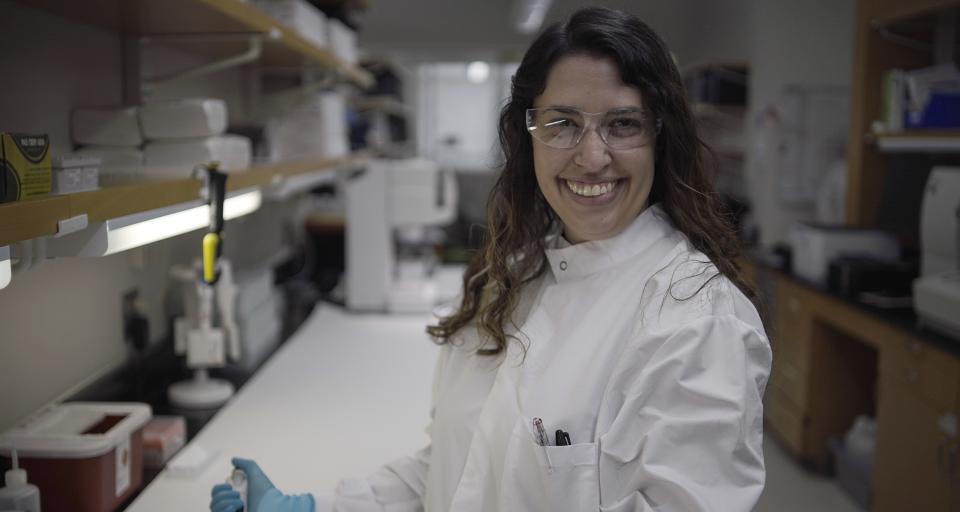
"I obtained a Bachelor of Science degree in biochemistry from UNC-Greensboro. From there, I completed a year-long medical laboratory science program for my MLS certification. I worked for nine years in the core laboratory of a large medical center performing hematology and chemistry testing. There, I gained experience in identifying hemoglobinopathies using capillary and gel electrophoresis. Relocating to the Triangle provided the opportunity to join the team here in the Newborn Screening Fluoroimmunoassay and Hemoglobinopathy laboratory.
"My favorite part of my job is being able to provide such vital information for health care providers and their patients from behind the scenes. My work in newborn screening is important for public health because babies are quite literally our future. Newborn screening is a service provided to all North Carolinians to detect a variety of conditions, which, combined with early intervention, can help to give little ones the best possible start toward a long, fulfilling life!"
Jamie, Tandem Mass Spectrometry Unit

"I graduated with a bachelor’s degree in biology with a minor in chemistry from UNC-Chapel Hill and obtained a second bachelor’s degree in clinical laboratory science. My laboratory career has included work at UNC Medical Center and UNC Hillsborough Hospital Laboratory. I currently supervise the Tandem Mass Spectrometry Laboratory in the newborn screening program.
"There is a lot that I love about my job! It is challenging and the program is always growing. My favorite thing about being a scientist is reviewing and analyzing data to provide the highest quality of service. My favorite thing from a personal perspective, and as a mom of two, is the positive impact that newborn screening makes, and I am proud to be a part of that. A large part of public health is promoting health care equity and accessibility. Newborn screening is a great example of this as it is offered for every baby in North Carolina. Public health initiatives keep communities healthy through child wellness, disease prevention, education, disaster relief, clean water, access to health care and much more."
Pamela, Fluoroimmunoassay (FIA) Unit

"I attended and received my bachelor's degree from Winston-Salem State University, where our motto is, 'Enter to Learn, Depart to Serve.' During my time at WSSU it became clear to me that I wanted an impactful career with service to others and passion about equitable health care. When I started my journey at the North Carolina State Laboratory of Public Health, I was a medical technologist and now lead as a supervisor in the Newborn Screening Unit. After being part of this organization for almost 20 years, it makes me proud to witness the work we have done to improve the health of North Carolina's residents.
"My favorite part of my job is the equitable service that we provide at the North Carolina State Laboratory of Public Health for each baby born in N.C. I find it greatly rewarding that we make such an impact on the lives of so many across our growing state. The screening results that we report give parents and providers the opportunity to make informed decisions on the care of their children so that they may thrive in healthy development. Public health is important as it provides knowledge to protect and improve the health of the community. Newborn screening is especially important as it provides a service to identify rare but treatable conditions for the states’ most vulnerable citizens."
Rachana, NBS Molecular Unit

"I received my Ph.D in microbiology from Texas A&M University. After that, I worked as a postdoctoral researcher for a couple of years with a focus on HIV-1 and non-alcoholic fatty liver disease (NAFLD) before joining the Virology/Serology Unit at NCSLPH in July 2020. At the beginning of 2022, I had an opportunity to join the Newborn Screening Unit as a molecular public health scientist.
To be part of a team for a program like newborn screening is very fulfilling. We do high volume testing every day with 500-1,000 samples per day for a wide variety of conditions. I truly believe newborn screening serves as an exemplary model of public health work at its best. Through screening for a wide variety of disorders in all newborns in North Carolina, we are actively advancing public health and promoting the well-being of our community. And with early identification of some of the hereditary genetic disorders that we screen for, we are not just helping the individual patient but many generations to come. This proactive approach of early detection and intervention empowers families to make informed decisions about these conditions. Thus, our work in newborn screening shows the critical role of public health in enhancing the quality of life for families in our community."
Beata, Procurement and Accounting
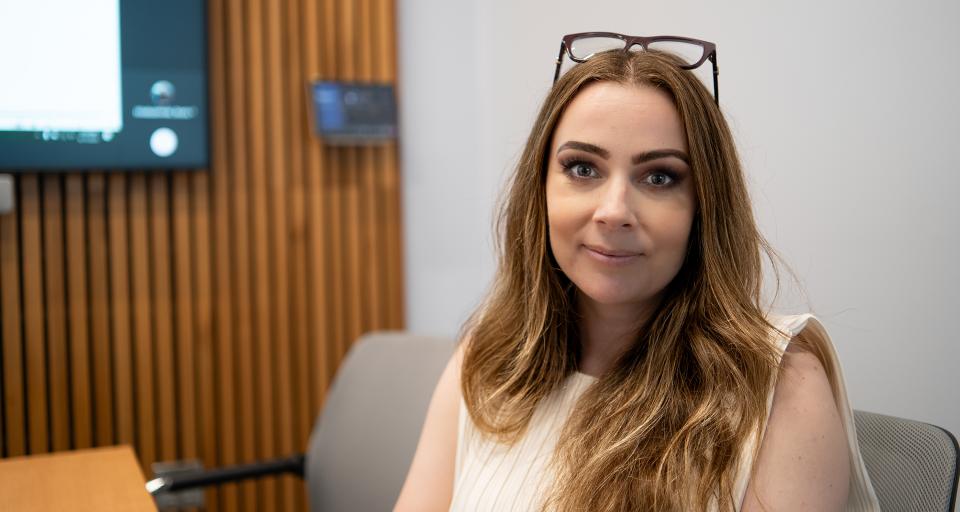
Beata was born and raised in Poland, where she studied environmental engineering and graduated from the University of Technology in Rzeszow. After moving to the U.S. in 2015, she realized her love for working with numbers.
She started at NCSLPH as an accounting specialist and now works as the lab’s administrative officer. Beata enjoys the variety in her job and the satisfaction of supporting important health work from behind the scenes.
Sarah, Sequencing and Bioinformatics Response (SaBR) Unit
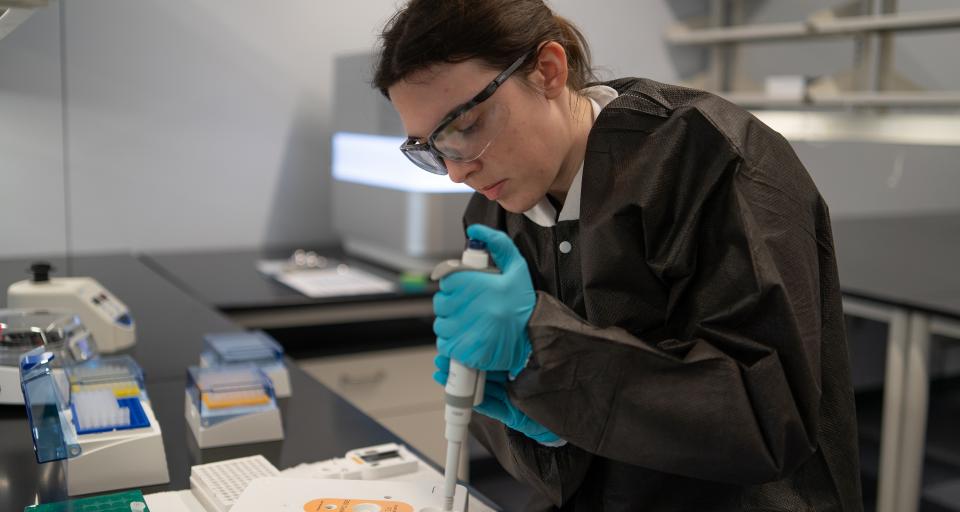
Sarah is a laboratory specialist in the SaBR Unit. She spends most of her day in the lab preparing DNA samples. After she finishes, her team analyzes the data to help track and understand infectious diseases. This process can take up to a full work week.
Sarah also works on the computer, organizing data and supporting the rest of the team. Sarah loves being part of a great team and says every day is different.
Laura, Rabies Unit

"I was always interested in science, even as a young kid. I obtained my B.S. in biology from Marshall University in Huntington, West Virginia. After graduating, I worked at the West Virginia Public Health Department for 12 years. That gave me the opportunity to really get a big picture overview of how many aspects of scientific testing can affect public health. When I started at the NCSLPH, I was very excited to be a part of a larger, more specialized version of the job I had loved for years. Working at this lab has been a step in my career that I am very proud of achieving.
"The rabies section workload always gives me the variety I crave, and our science is consistent in its high standards. I enjoy knowing that my daily work makes a difference in other people’s lives. I am very pleased that public health has positively impacted the lives of our community; rabies in no longer a death sentence that people must fear today. Knowledge and prevention are important keys in keeping our community safe."
Robin, Molecular Virology Unit

"My current position at the North Carolina State Lab of Public Health is the influenza specialist within the Molecular Virology Unit. Prior to this, I received a Bachelor of Science degree in zoology from North Carolina State University and held several positions in a variety of fields. I have worked as a microbiologist at an environmental lab, medical technologist in the Special Serology and Viral Culture/ Rabies Units, forensic scientist at the North Carolina State Crime Lab, and an application specialist at a private medical device company. The experience that I gained from those roles has been critical to success in my current role.
"What I like most about my position is applying my scientific knowledge to help keep our community healthy. Some of the viruses that we test for utilizing molecular biology techniques include Herpes Simplex Virus, Varicella Zoster Virus, SARS-CoV-2 and influenza. My position is important to public health because of my involvement with influenza surveillance. This involves testing influenza specimens and providing results, which will be used to monitor influenza in the population and determine how vaccines will be produced."

